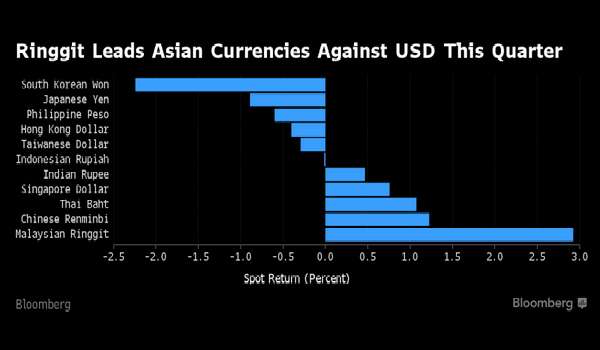Pakar ekonomi melihat ekonomi Malaysia positif dan memberangsangkan. Sebaliknya pembangkang Malaysia masih dengan propaganda ‘Malaysia bakal muflis’
Pembangkang terus membodohkan pengikutnya yang memang bodoh.
Aset Malaysia kembali memihak kerana pelabur memberi tumpuan kepada tanda-tanda pemulihan ekonomi yang menggalakkan bukannya skandal yang telah menyentuh terhadap kerajaan dan sejauh sehingga ke Hollywood.
Peralihan ini bermakna bahawa Perdana Menteri Datuk Seri Najib Razak, yang telah berjaya mengharungi serangan politik dan bantahan sejak 2015 atas tuduhan yang melibatkan 1Malaysia Development Bhd. (1MDB) milik negara, Boleh memanggil pilihan raya awal untuk mengukuhkan kuasa.
Ringgit dengan mudah menjadi mata wang utama terkuat Asia yang pada suku ini, Melonjak dua kali ganda yang terbaik selepas matawang Yuan China. Dana Global telah membeli paling banyak saham Malaysia tahun terkini berbanding tempoh yang sama pada tahun 2013, dan aliran masuk bersih kepada pasaran bon melonjak pada bulan April dan Mei.
Pelabur luar negara telah membeli $ 2.48 bilion ekuiti Malaysia tahun ini, aliran masuk saham yang terbesar di Asia Tenggara. Indeks FTSE Bursa Malaysia mencecah paras tertinggi dalam tempoh dua tahun pada 16 Jun dimana saham teknologi, bank-bank dan pembinaan melonjak.
*******
The Ringgit Is Easily Asia’s Strongest Currency
Malaysian assets are back in favor as investors focus on encouraging signs of an economic turnaround instead of a scandal that has touched the top of government and as far as Hollywood.
The stark shift means that Prime Minister Najib Razak, who has weathered political attacks and protests going back to 2015 over allegations involving state-owned 1Malaysia Development Bhd., may call an early election to cement his hold on power.
The ringgit is easily the strongest major Asian currency this quarter, climbing twice as much as the next best, the Chinese yuan. Global funds have bought the most Malaysian stocks year-to-date since the same period in 2013, and net inflows to the bond market surged in April and May.
“As long as we see improvement on the macro data with the support of global conditions and stable energy prices, we will keep our cautiously positive stance for Malaysia,” London-based Aksoy said.
Baca selanjutnya disini: ‘1MDB Loot Included Picasso, ‘Dumb and Dumber To,’ U.S. Says’ https://www.bloomberg.com/news/articles/2017-06-15/u-s-seeks-to-recover-540-million-tied-to-tainted-1mdb-fund
Overseas investors have purchased $2.48 billion of Malaysian equities this year, the biggest stock inflow in Southeast Asia. The FTSE Bursa Malaysia index hit its highest in two years on June 16 as technology, banks and construction shares soared.
Samsung Asset Management is buying Malaysian banking, property and construction stocks on bets the government will pump prime ahead of the election, according to Hong Kong-based fund manager Alan Richardson. Meanwhile, it’s paring technology and commodity-related holdings.
“Domestic cyclicals will outperform while global cyclicals will underperform,” Richardson said. This is due to “a combination of global monetary stimulus and domestic early election stimulus.”
The stock market’s gains came as the ringgit rebounded from a 19-year low. After missing out on an earlier rally in regional currencies, it strengthened as growth quickened and concerns eased over an earlier move by the central bank to deter currency speculators. The ringgit was 4.2943 per dollar as of 10:51 a.m. in Kuala Lumpur, up 0.1 percent from Wednesday.
Bond investors have also returned. Malaysian debt securities drew more than 16 billion ringgit ($3.7 billion) in April and May after recording the longest stretch of outflows in two years. The yield on 10-year notes has fallen 57 basis points to 3.89 percent since reaching an eight-year high in November.
Still, not everyone is convinced. Nomura Holdings Inc. is underweight on Malaysian stocks, citing expensive valuations and doubts that the growth momentum can be sustained.
“I find it difficult to justify buying Malaysia’s genuine story while ignoring the risks on valuations and also the existing risk that the Malaysian market comes with,” said Mixo Das, Nomura’s Southeast Asian equity strategist in Singapore. “The market probably goes up a bit more till the election, but what happens after it?”
A general election isn’t due until mid-2018, but there’s growing speculation that Najib will call for polls this year with growth holding up and the opposition parties racked by infighting. The premier said earlier this month that preparations for the election were going well.
The economic outlook has helped to counter headlines involving 1MDB, which is at the center of money-laundering allegations and probes in several countries. The U.S. Justice Department is seeking to recover $1.8 billion in assets it says were bought with funds misappropriated from 1MDB.
Complaints filed in a U.S. court alleged that from 2009 through 2015 more than $4.5 billion belonging to 1MDB was diverted by officials of the fund and their associates. Najib, who until last year was the chairman of 1MDB’s advisory board, has denied wrongdoing and was cleared by Malaysia’s attorney general.
For Schroder Investment Management Ltd., economic factors trump politics when investing in Malaysian bonds. It also favors the ringgit due to the nation’s positive outlook.
“Key considerations are improving fiscal dynamics, dynamics around central bank policy, attractive economic policies, sensitivity to developed market and China developments,” said Manu George, a Singapore-based fixed-income director at the firm.
******














